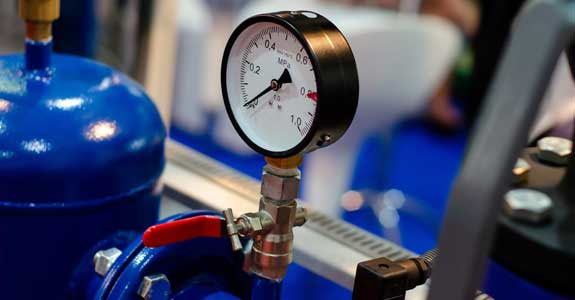Perform regular boiler maintenance to improve workplace safety
Having a functioning, efficient boiler is key to keeping your business warm and at peak efficiency during winter. But when's the last time you looked inside your boiler room? Keeping tabs on your boiler starts in the boiler room itself. Mutual Boiler Re, who conducts all the boiler inspections for our customers, stresses this room shouldn't be an all-purpose storage area. Here are some boiler basics to follow:
Cleanliness: Keep the room clean and free of clutter. A boiler room needs good air circulation for proper fuel consumption, which prevents the production of carbon monoxide. It's also important to keep combustible materials such as dirty rags and flammable liquids out of this area, since they're potential fire hazards.
Operating conditions: Walk around the boiler and look for any signs of leakage, excessive heat, poor ventilation, corrosion, loose or damaged electrical wiring, gas or oil leaks, or missing safety devices.
Operating guidelines: Verify your current installation meets or exceeds combustion control guidelines consistent with the type of equipment present in accordance with National Fire Protection Association (NFPA) and American Society of Mechanical Engineers (ASME) CSD-1 (Controls and Safety Devices for Automatically Fired Boilers) standards.
Safety controls: Implement a documented program for inspection, testing, and maintenance of combustion control equipment. Test safety controls at least annually, using qualified instrumentation technicians.
With general maintenance now on your radar, there are also three areas of concerns to monitor—boiler overheating, boiler overpressure, and boiler water treatment. We'll start with overheating.
Boiler overheating
Boiler operation needs the continuous circulation and replenishment of water. Overheating can occur when the boiler continues operating when water levels get too low. This is called dry firing.
According to Mutual Boiler Re, dry firing when water levels are low could lead to:
Loose tubes
Deformed pipes
Tube collapse
Ruptures
Melting of metal
Have a monitoring system in place to track the water level and shut down the boiler if it drops too low.
Boiler overpressure
Another hazard is overpressure. According to FM Global, a member of the FM Global Group along with Mutual Boiler Re, overpressure occurs in boilers or pressure vessels when normal devices fail to maintain heat or pressure input below the maximum allowable levels.
To help make sure this doesn't happen, have safety measures—such a safety relief valve—in place. Pressure relief devices are always directly attached to boilers. They may be either directly attached to the pressure vessels or attached to the inlet piping of the vessel.
You can do the following at your business now:
Lift test safety and relief valves to confirm freedom to operate
Check overpressure devices for signs of leakage
Visually inspect safety and relief valves for sealing wire, to ensure the valve setting
FM Global offers more information on boiler and pressure vessel overpressure.
Boiler feedwater treatment
Maintaining a boiler isn't as simple as adding water and walking away. Treating that water, known as feedwater, helps maintain steam purity and the long-term integrity of your pressure parts. Without feedwater treatment, minerals and other compounds remain in the water, leading to corrosion, pitting, and buildup in boiler components.
Boiler water should be treated to avoid these issues. Remove suspended solids with filters and dissolved gas by deaeration. Have some sort of feedwater treatment in place and monitor it regularly. In some cases, a simple water softener does the trick.
When it comes to boiler feedwater treatment, FM Global advises you to:
Test your boiler water on a regular basis
Follow your water treatment company's recommendation for types and quantities of chemicals to add to your boiler water
Document chemical use
Inspect water treatment piping and valves
Ensure instrumentation and automatic controls are working properly
Learn more about boiler feedwater treatment.
Boiler room personnel
Does your staff operate the boiler at your business? According to Mutual Boiler Re, operator error is the top cause of boiler accidents that lead to property loss. To reduce the risk:
Make sure all employees who operate or maintain the boiler room are trained on all equipment, controls, safety devices, and operating procedures.
Keep a logbook for the boiler room, and record the maintenance schedule, testing, safety checks, and any repairs made.
Protect your business
Remember, Hortica covers boiler inspection costs and associated fees. In addition, boiler and pressure vessel certificate fees are covered in the following jurisdictions:
California
Hawaii
Kentucky
New Jersey
New York
South Dakota
West Virginia
Omaha, Nebraska
Contact your agent about this, or if you have any questions about boiler safety. We're ready to help you reduce your risks in the workplace.
The information in this article is for informational or entertainment purposes only. View our disclaimer by going to terms and conditions and clicking on Learning Center disclaimer in the table of contents.
